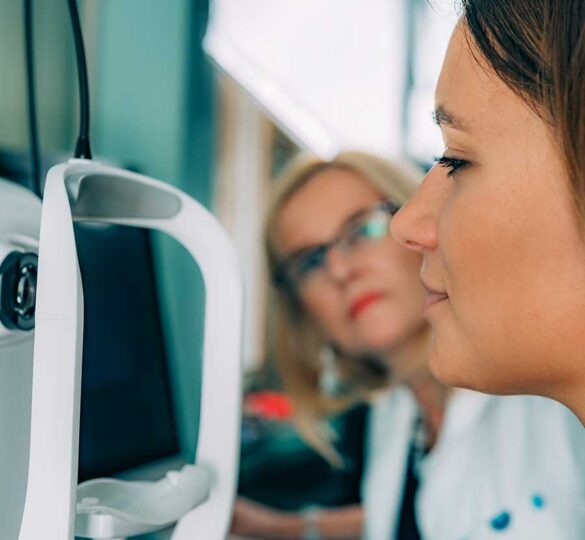The Eye Exam Demystified
Regular eye exams can do much more than just check your vision — they can detect early signs of serious conditions like glaucoma and diabetes.

Getting an eye exam can feel mysterious — or even intimidating for many people. Maybe it’s the unfamiliar equipment, the fear of bad news, or simply not knowing what to expect. The good news? You’re not alone, and there’s no need to worry. We’re here to walk you through the process, answer your questions, and show you that an eye exam is simple, painless, and essential to protecting your health.
Vision loss can significantly impact a person’s quality of life, making everyday tasks like reading, driving, or recognizing faces difficult. It increases the risk of falls and injuries, especially among older adults, and can lead to social isolation, depression, and loss of independence. Approximately 93 million U.S. adults are at high risk for vision loss, yet only half have visited an eye doctor in the past 12 months. Early detection and treatment are critical, as many causes of vision loss are preventable or manageable with timely care.
However, regular eye exams can do much more than just check your vision — they can detect early signs of serious conditions like glaucoma, diabetes, and high blood pressure. Taking care of your eyes is taking care of your whole body, and it all starts with understanding what an eye exam involves.
What Happens During an Eye Exam?
A comprehensive eye exam typically includes several steps. Here’s what you can expect:
1. Medical History Review
Your eye doctor will ask about the following:
- Your general health
- Family history of eye disease
- Medications you’re taking
- Vision issues you’re experiencing
2. Visual Acuity Test
You’ll read letters from an eye chart to check how well you see at various distances. This determines if you need corrective lenses.
3. Refraction Test
This helps pinpoint your prescription for glasses or contacts using a phoropter device. You’ve probably heard the “Which is better — 1 or 2?” question during this test.
4. Eye Muscle and Pupil Response Tests
You’ll be asked to look at a small light and follow it by moving your eyes. This demonstrates:
- How your eyes move and work together
- How your pupils react to light and objects at different distances
5. Slit Lamp Exam
A special microscope checks the front parts of your eye, including the cornea, iris, and lens. This test can help spot cataracts or corneal injuries.
6. Intraocular Pressure Test (Tonometry)
It measures the pressure inside your eyes and helps detect glaucoma. One standard method uses a puff of air on the eye’s surface.
7. Retinal Exam
Your doctor may use dilation drops to widen your pupils and examine the back of your eye (retina). This helps detect damage from diseases like diabetes or high blood pressure.
Helpful Tips For Your Next Eye Exam
Before Your Appointment:
Whether it’s your routine annual checkup or a glaucoma screening, take a few simple steps to prepare. Avoid alcohol the day before — its blood vessel-dilating effects can affect your results — and try to rest your eyes by steering clear of late-night screen time. Don’t forget to bring your current glasses and a list of all your medications.
During the Exam:
You’ll start with a standard vision test, reading from charts with letters and numbers. Your doctor may use eye drops to dilate your pupils to view your retina and optic nerve better. You can expect a visual field test if you’re getting tested for glaucoma. During a common version of this test, you’ll press a button each time you see a flashing light to help assess your peripheral vision. The doctor may also measure your eye pressure.
After the Exam:
If the doctor dilates your eyes, expect blurred vision and light sensitivity for a few hours. Bring sunglasses for the ride home, and consider asking a friend or family member to drive you. Typically, there are few other side effects after an exam, but your eyes may feel tired.
How Often Should You Get an Eye Exam?
Early detection of ocular conditions, through regular and complete eye exams, is the key to protecting your vision. It is essential to have your eyes examined regularly.
The frequency of eye exams depends on your age, risk factors, and whether you wear corrective lenses. Here’s a general guide from the Centers for Disease Control and Prevention (CDC):
- Children (6-17): Every 1-2 years
- Adults (18-60): Every 2 years
- Seniors (61+): Annually
- At-risk groups: Annually or as advised by your doctor
At-risk groups include people with diabetes, a family history of eye disease, or those who work in visually demanding or hazardous environments.
You should get a comprehensive baseline eye screening at age 40. Early signs of eye disease and vision changes may occur at this age. Your eye doctor will tell you how often to have follow-up exams based on the results of this screening. If you have diabetes, high blood pressure, or a family history of glaucoma, you should see an eye doctor now to determine how often to have eye exams.
Video: The Importance of Complete Eye Exams
Help Us Find a Cure
Eye exams are quick, painless, and incredibly valuable. Whether updating your prescription or catching something early, visiting the optometrist is a smart move for your health.
While there is no cure for glaucoma, advancements in research continue to bring us closer to finding one and restoring vision loss. You can help find a cure by donating cash, stock, or a vehicle. Your support will give hope to those living with glaucoma and accelerate our search for a cure and vision restoration.
The tireless work of researchers continues to improve our understanding of glaucoma daily. As a result, there is great hope for new and improved treatments, including innovative drug delivery methods, laser treatments, and less invasive surgical techniques. You can help make that happen!
Last updated on July 15, 2025. Article reviewed for medical accuracy by Terri-Diann Pickering, MD.

Terri-Diann Pickering, MD
Dr. Pickering completed her ophthalmology residency at the University of California San Francisco and a glaucoma fellowship at the USC-Doheny Eye Institute in Los Angeles after earning her degree from Harvard University Medical School. She is a clinical instructor at California Pacific Medical Center and a researcher with the Glaucoma Research and Education Group in San Francisco.